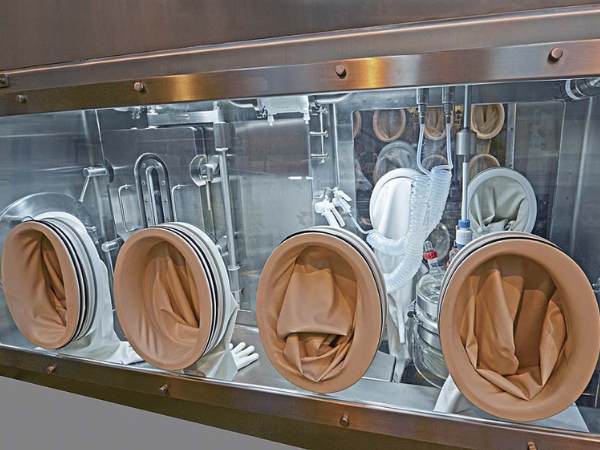Highly potent active pharmaceutical ingredients (HPAPIs) are a cornerstone in pharmaceutical manufacturing. They are especially prevalent in targeted therapies and personalised medicines. This is mainly because of their potent therapeutic effects at low dosage forms.
The opportunities that high-potency APIs present for novel drug development are countless. However, HPAPI development and manufacturing is also fraught with challenges. There’s no harmonised global standard on safety and quality protocols in HPAPI production, but the regulatory landscape is changing. For instance, most companies follow ISPE Guidelines when it comes to particular containment performance. At the very least, companies must adhere to robust standard operating procedures (SOPs) which include quality systems, containment strategies, employee training programmes, and more.
Despite this stringency, there are more state-of-the-art highly potent APIs in drug development pipelines than ever. Highly potent compounds were initially the remit of oncology research. They had limited applicability for drug products beyond cancer treatment because of their limited specificity. That status quo has changed. Novel drug delivery systems, such as antibody-drug conjugates (ADCs), have opened the door to highly targeted therapies. They offer exceptional efficiency while mitigating some of the side effects associated with cancer therapies.
Many commercial aspects compound this enhanced efficacy, too. Companies can now produce HPAPIs with high levels of pharmacological activity using reduced volumes of active ingredients. This burgeoning market is expected to reach $32 billion by 2028, indicating a broader transition towards more efficacious and tailored treatment regimes.
So, how do HPAPI manufacturers overcome these challenges to realise the rewards of the opportunities?
Challenges of HPAPI Manufacturing
Containment

HPAPI manufacturing and development mandates heightened emphasis on containment. This is essential to ensure personnel safety, environmental protection, and regulatory compliance. Occupational exposure limits (OEL) for HPAPIs are extremely low. This implies that exposure to even minuscule volumes can pose severe health risks to workers. Additionally, the dangers of cross-contamination of other products cannot be overlooked.
HPAPI handling requires isolated manufacturing zones specifically designated for high-potency products. These zones are meticulously engineered to prevent the migration of hazardous particles to non-designated areas. Specialised equipment, rigorous protocols, and robust facility design factor into the engineering controls of containment zones. Essential measures include:
- Closed systems
- High-efficiency particular air (HEPA) filtration
- Dedicated air handling units
- Stringent decontamination protocols
Delineating clearly defined zones, restricting personnel movement, and deploying advanced containment technologies underscore the industry’s commitment to safely handling potent compounds in commercial manufacturing of new drug systems.
Scalability
Scalability is another challenge. Early molecule discovery must transcribe to a feasible commercial product. This requires robust equipment suitable for scaling–or good relationships with outsourcing partners. The high value and, indeed, the potency of HPAPIs present different manufacturing scales and batch volumes to traditional APIs. Meeting market demand typically requires less volumes and smaller batches to minimise financial risk relating to batch losses.
Outsourcing Decisions
Outsourcing HPAPI manufacturing can solve the infrastructural headache of getting it right. However, the decision is multi-faceted. In-house manufacturing demands a substantial investment in specialised facilities and equipment, alongside a commitment to ongoing compliance with evolving regulatory standards. Outsourcing to contract manufacturing organisations (CMOs) or contract development and manufacturing organisations (CDMOs) can alleviate those burdens.
However, outsourcing is naturally replete with risk. The primary concern is selecting competent CMOs or CDMOs with proven expertise in handling highly potent compounds safely. HPAPI manufacturing is inherently complex, necessitating a deep understanding of properly handling potent substances. Furthermore, compliance with evolving regulatory standards, ensuring stringent quality control, and safeguarding intellectual property are pivotal challenges. Companies may, for example, choose to conduct in-house R&D but move commercial production to the CMO. Conversely, a CDMO may begin the research to enable the company to open its manufacturing site. This production chain is increasingly important in HPAPI production, requiring various stakeholders with the right equipment working in tandem.
These risks underscore the need for meticulous planning, clear contractual agreements, and the selection of a reliable outsourcing partner when considering outsourcing HPAPI manufacturing.
Seizing the Opportunities
Market Growth
The anticipated upswing in the HPAPI market represents an enormous opportunity. This growth is underpinned by the escalating demand for targeted therapies and personalised medicine, wherein HPAPIs play a vital role due to their potent therapeutic efficacy. This is a huge commercial opportunity driven by the potential to command premium pricing owing to the specialised nature of HPAPIs. Besides, the growing prevalence of chronic ailments further catalyses this demand, heralding a new revenue stream for HPAPI manufacturers.
Emerging HPAPI manufacturing technologies herald a new era of innovation and efficiency in pharmaceutical development. These advancements, ranging from novel containment solutions to automation and real-time monitoring systems, are pivotal in overcoming the inherent challenges posed by HPAPI manufacturing. By facilitating enhanced control over the manufacturing process and minimising the risks of contamination, these technological strides not only bolster operational efficiency but also propel the industry towards elevated safety standards.
Pioneering Solutions from Powder Systems Ltd
Powder Systems Ltd.’s (PSL) Agitated Nutsche Filter Dryers (ANFD) are a pragmatic solution to the challenges associated with HPAPI manufacturing. The ANFD system is engineered to address the quintessential issues of containment and safety, thereby mitigating the risks of contamination and exposure.
The superior functionality of our ANFD system facilitates seamless and efficient HPAPI manufacturing. By amalgamating robust containment with streamlined operations, the ANFD system paves the way for bolstering safety and augmenting productivity. This dovetails with the overarching objective of achieving enhanced profitability in HPAPI manufacturing.
Contact our Experts to explore tailored solutions that align with your operational requirements.
